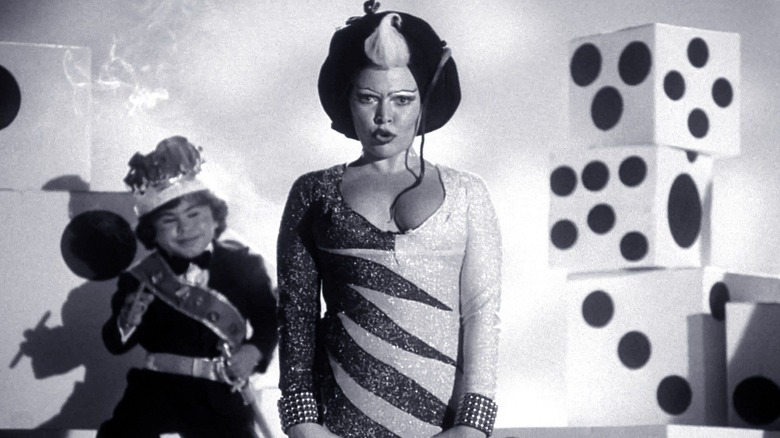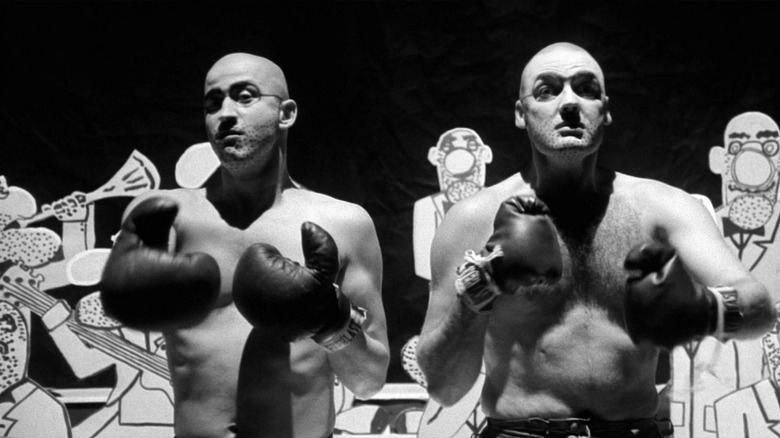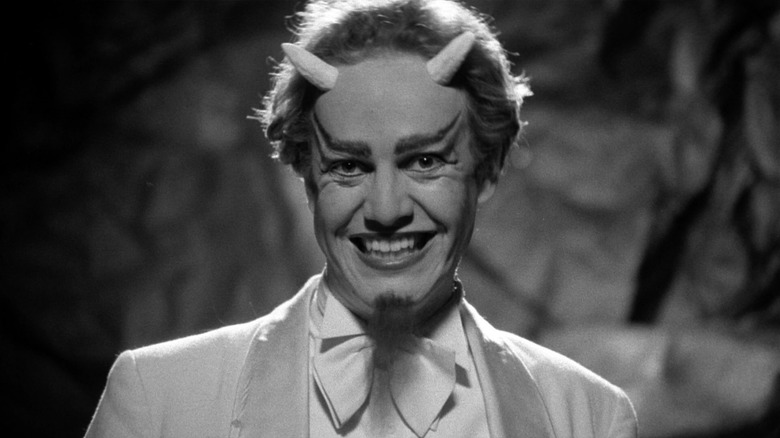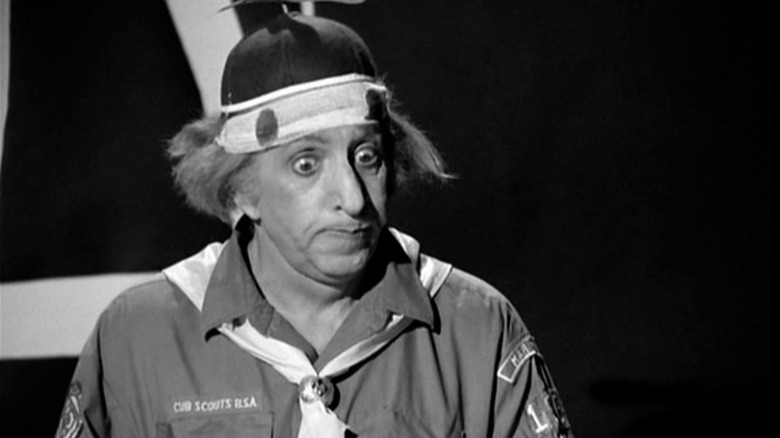The Daily Stream: Going Down, Down, Down Into Forbidden Zone
(Welcome to The Daily Stream, an ongoing series in which the /Film team shares what they've been watching, why it's worth checking out, and where you can stream it.)
The Movie: "Forbidden Zone"
Where You Can Stream It: Tubi, Kanopy, Night Flight, Plex, Flixfling
The Pitch: Back in 1972, one Richard Elfman, then only a lad of 23, founded a musical theater troupe on the streets of Los Angeles called the Mystic Knights of the Oingo Boingo. This was after performing music in Paris and being involved in numerous theater projects throughout his youth. The Mystic Knights were a massive band, consisting of 15 members, and dedicated to performing old songs from the 1920s through the 1940s. For an early glimpse of what kind of act the Mystic Knights performed, check out their appearance on "The Gong Show" in 1976. Richard is the one in the miniature rocket ship playing the train whistle. Buddy Hackett gave them a 6, Shari Lewis gave them an 8, and Bill Bixby gave them a 10.
The Mystic Knights of the Oingo Boingo were taken over by Richard's brother, Danny, who would eventually transform the troupe into a proper rock band, and shorten the name to Oingo Boingo. The first Oingo Boingo EP would appear in 1979. Danny Elfman would, as many know, eventually move into scoring films and has enjoyed a long, lucrative career in movies.
In the middle of the Oingo Boingo formation came "Forbidden Zone," which could be described as the Mystic Knights movie. Shot for a minuscule budget of about $100,000, "Forbidden Zone" was a surreal, black-and-white musical about a hapless family of weirdos who foolishly enter a portal in their basement that leads to the sixth dimension, a hellish realm overseen by the horny King Fausto (Hervé Villechaize).
Why it's essential viewing
The makers of "Forbidden Zone" are seemingly trying to capture the experience of watching surreal 1930s Betty Boop cartoons, recalling a time from early youth when a ghost lip-synching Cab Calloway caused nightmares and inflamed the imagination. They then took that feeling and mixed in a DIY punk rock sensibility, while adding heaping helpings of old-fashioned burlesque — the Princess of the sixth dimension (Giselle Lindley) spends the entire film topless. The sets are expressionistic plywood monstrosities that evoke a community theater vibe but are presented by kids who found "The Rocky Horror Picture Show" to be a mite too restrained.
"Forbidden Zone" follows the Hercules family, who live in a shanty above a portal to the sixth dimension. The adult children attend a horrid school by day where the gentle Frenchy (Marie-Pascale Elfman), the perverted Flash (Phil Gordon), and their friends Squeezit and his trans sister Renee (both Toshiro Baloney, a.k.a. Matthew Bright, the director of "Freeway") are abused and berated. Ma and Pa Hercules (Virginia Rose and Ugh-Fudge Bwana) warn the kids away from the portal, and they lip-synch to Calloway's "Some of These Days." Frenchy, still intrigued, investigates, slips through the portal, and is literally pooped out the other end. The rest of the family goes in after her.
The sixth dimension is a demented, low-budget Hellscape of glorious surreality. Humanoid frog butlers dance in front of topless princesses. The Kipper Kids (look 'em up) perform for the enjoyment of royalty. King Fausto sits on his throne next to the amazing Queen Doris (Susan Tyrrell), a bouffanted she-devil of the highest order. Few will walk away from "Forbidden Zone" without counting Doris as one of their new heroes. She is the Frank N. Furter of this movie.
The weird point in time
King Fausto, recognizing a fellow French person, instantly falls in lust with Frenchy, all to the very open chagrin of Doris, his wife. While Fausto romances Frencht, Doris plots revenge, and the rest of the family wanders through the craft paper tunnels, encountering dungeons, monsters, and sex.
The songs by Danny Elfman and the Mystic Knights of the Oingo Boingo are a wonderful proto-New Wave playground of playful sounds that straddle the line between electronic experimentation and 1930s bandstand standards. Fans of Oingo Boingo will hear how well-developed the band was right from the start, and shades of "Ain't This the Life" and "Nasty Habits" might reach the ear. Oh yes, and Danny Elfman does appear in the film as the Devil, singing about his lust for the Princess in a parody of "Minnie the Moocher." Danny's appearance is a highlight in a film full of them.
A warning: As part of the filmmakers' attempts to capture the vibe of 1930s entertainment, they do employ a few moments of blackface imagery. The images themselves are going to shock a modern audience. While Elfman and company were aiming for a particular generation's iconography, they scooped up a few offensive images along the way. These images are not pervasive but be warned that they do appear in earlier cuts of the film. If you catch a colorized or remastered version, however, Elfman has since used CGI to alter the offensive scenes.
"Forbidden Zone" came out during a curious, small window in 1979 and 1980 when some of the world's most bizarre rock musicals were released. "Forbidden Zone" found peers in "Sgt. Pepper's Lonely Hearts Club Band," "Xanadu," "Popeye," "Can't Stop the Music," and the Cannon Group's sci-fi oddity, "The Apple." Taken as a whole, these films may be considered a bonkers trend unto themselves. Someone program a festival.
The spirit of burlesque
Like many cult movies, "Forbidden Zone" is most notable for its earnest excesses. This was a film clearly made by passionate, weird people who felt an undeniable need to entertain, driven by a childlike impulse to share one's off-center passions. Richard Elfman liked theater, strange music, and old cartoons, and assembled a chintzy, quotable burlesque show. It helped that he had committed and charismatic actors to work with. To reiterate, Susan Tyrrell is legendary and this film might be one of her most striking performances. No one can tear into outraged cuss words like Tyrrell, delivering her every line with three exclamation points.
Watching "Forbidden Zone" also provides a fascinating look at the arc of Danny Elfman's film career, from "Nightmare Before Christmas" to "Doctor Strange and the Multiverse of Madness," his best score in years. "Forbidden Zone" would lead directly into both Oingo Boingo and his work as a film composer. For many years, Danny was the go-to "quirky" film composer, having written memorable themes for the works of Tim Burton. As time passed, one could hear the works of Igor Stravinsky burrow their way into Danny's music, and his sound became increasingly orchestral. Oingo Boingo gave their last performance on Halloween of 1995 — I was there — and Danny moved to film scores exclusively, earning four Oscar nominations and an Emmy nod for his theme for "The Simpsons." In the early 2000s, Danny deliberately abandoned a lot of his best-known signatures, happy to explore new sounds and techniques. As an artist, he may move wherever he wishes, of course, but fans of his early work often miss Danny's Tim Burton days.
Richard, meanwhile, has continued to be an enthused kook, and went on to make weirdo horror movies like "Shrunken Heads," "Modern Vampires," and "Aliens, Clowns, and Geeks."
"Forbidden Zone 2" is still in development.



